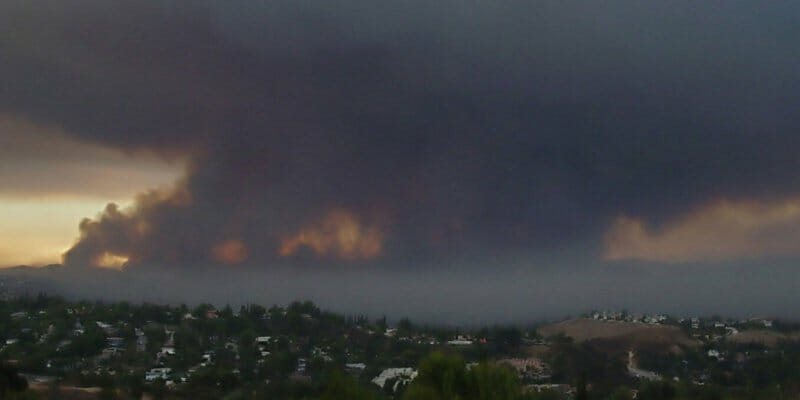As Temperatures Rise, Heat Waves Will Take More Lives
Scientists also find that deaths linked to smoke from wildfires could more than double in the U.S., to perhaps 40,000 a year. Smoke inhalation is the main way that wildfires kill. (Nerval / Wikimedia Commons)
Smoke inhalation is the main way that wildfires kill. (Nerval / Wikimedia Commons)
Once again, researchers have confirmed that limiting global warming will save lives by reducing the impact of killer heat.
An international team has checked predictions for heat-related deaths against some of the global average temperatures likely later this century, to issue this warning: it will be a safer world if temperatures creep up by only 1.5°C over historic levels. Fewer people will die in the ever more intense heat extremes that will go with average global temperature rises.
And a second, separate study of the impact of forest, bush and wildfires on human health has warned that – in the US alone – deaths linked to smoke could more than double, to perhaps 40,000 a year.
The world has already warmed by around 1°C in the last century: the limit of “well below 2°C” set by 195 nations when they met in Paris in 2015 looks increasingly close.
Scientists from Britain, Europe, Australia, the US, Brazil, Chile and China report in the journal Climatic Change that they looked at records for temperature-related deaths from 451 places in 23 countries and then projected likely deaths as global average temperatures rose by 1.5°C, and then up to 3°C and 4°C.
“Large parts of the world could experience a dramatic increase in excess mortality due to heat. This would not be balanced by decreases in cold-related deaths”
They found that at the higher forecasts, hazards rose steeply: in the worst instances, by almost 9%.
Alarm about the impact of heat waves on human health is not new: in the last few years researchers have warned that by 2100, around 75% of humanity will be at some risk of death by heat extremes. Another group has measured suicide statistics and seen a rise with temperature extremes.
A third group has focused on the double hazard of ever greater heat and humidity, and a fourth has identified at least 27 different ways in which heat waves can claim lives.
So the latest study is separate confirmation, this time by medical scientists who need to know what to expect as the thermometer rises.
Limiting fatalities
“Our projections suggest that large increases in temperature-related deaths could be limited in most regions if warming was kept below 2°C,” explains Ana Maria Vicedo-Cabrera, who led the study.
“Under extreme changes in climate, large parts of the world could experience a dramatic increase in excess mortality due to heat. This would not be balanced by decreases in cold-related deaths. Efforts to limit the increase in global temperature to below 1.5°C could provide additional benefits in tropical or arid regions, including the most populous and often poorest countries.”
With ever higher temperatures there will be ever more prolonged droughts, and inevitably greater risk of wildfire, and particularly in the US.
Right now, wildfires in the US claim an estimated 15,000 lives a year, chiefly through smoke inhalation that can worsen chronic pulmonary conditions, or hasten death in people with heart conditions.
By 2100, scientists report in the American Geophysical Union journal Geohealth, the death count in the contiguous US could reach 40,000 a year.
Particulate menace
The study recognizes that wildfire hazard has a number of causes and that climate change is only part of the story. But in the first six months of 2018, the US government’s own National Oceanic and Atmospheric Administration recorded 37,718 fires that burned almost 20,000 square kilometres.
In 2017, wildfire fighting cost the US Forest Service a record $2.4bn. And each fire hurled high levels of particulate matter – soot and other detritus – into the atmosphere, and into a nation’s eyes and lungs.
“We know from our own research and many, many other groups that smoke has negative impacts on human health,” said Jeff Pierce, an atmospheric scientist at the University of Colorado, and one of the authors.
“With the knowledge that fires have been increasing in parts of the US, we wanted to look at how bad this might get.”
Your support matters…Independent journalism is under threat and overshadowed by heavily funded mainstream media.
You can help level the playing field. Become a member.
Your tax-deductible contribution keeps us digging beneath the headlines to give you thought-provoking, investigative reporting and analysis that unearths what's really happening- without compromise.
Give today to support our courageous, independent journalists.






You need to be a supporter to comment.
There are currently no responses to this article.
Be the first to respond.